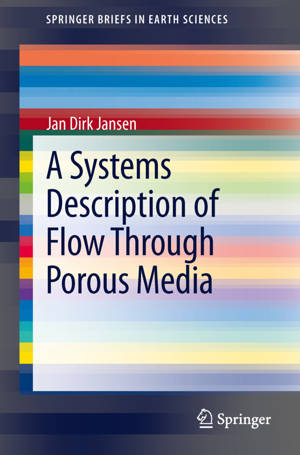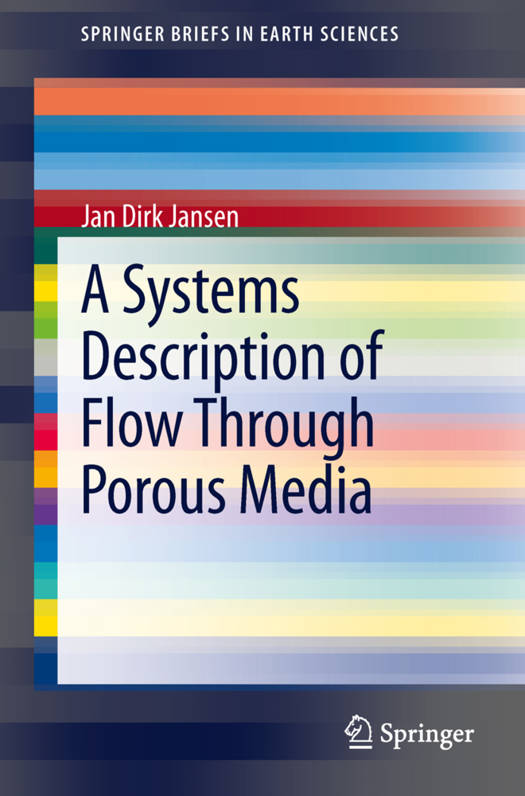
- Afhalen na 1 uur in een winkel met voorraad
- Gratis thuislevering in België vanaf € 30
- Ruim aanbod met 7 miljoen producten
- Afhalen na 1 uur in een winkel met voorraad
- Gratis thuislevering in België vanaf € 30
- Ruim aanbod met 7 miljoen producten
Zoeken
Omschrijving
This text forms part of material taught during a course in advanced reservoir simulation at Delft University of Technology over the past 10 years. The contents have also been presented at various short courses for industrial and academic researchers interested in background knowledge needed to perform research in the area of closed-loop reservoir management, also known as smart fields, related to e.g. model-based production optimization, data assimilation (or history matching), model reduction, or upscaling techniques. Each of these topics has connections to system-theoretical concepts.
The introductory part of the course, i.e. the systems description of flow through porous media, forms the topic of this brief monograph. The main objective is to present the classic reservoir simulation equations in a notation that facilitates the use of concepts from the systems-and-control literature. Although the theory is limited to the relatively simple situation of horizontal two-phase (oil-water) flow, it covers several typical aspects of porous-media flow.
The first chapter gives a brief review of the basic equations to represent single-phase and two-phase flow. It discusses the governing partial-differential equations, their physical interpretation, spatial discretization with finite differences, and the treatment of wells. It contains well-known theory and is primarily meant to form a basis for the next chapter where the equations will be reformulated in terms of systems-and-control notation.
The second chapter develops representations in state-space notation of the porous-media flow equations. The systematic use of matrix partitioning to describe the different types of inputs leads to a description in terms of nonlinear ordinary-differential and algebraic equations with (state-dependent) system, input, output and direct-throughput matrices. Other topics include generalized state-space representations, linearization, elimination of prescribed pressures, the tracing of stream lines, lift tables, computational aspects, and the derivation of an energy balance for porous-media flow.
The third chapter first treats the analytical solution of linear systems of ordinary differential equations for single-phase flow. Next it moves on to the numerical solution of the two-phase flow equations, covering various aspects like implicit, explicit or mixed (IMPES) time discretizations and associated stability issues, Newton-Raphson iteration, streamline simulation, automatic time-stepping, and other computational aspects. The chapter concludes with simple numerical examples to illustrate these and other aspects such as mobility effects, well-constraint switching, time-stepping statistics, and system-energy accounting.
The contents of this brief should be of value to students and researchers interested in the application of systems-and-control concepts to oil and gas reservoir simulation and other applications of subsurface flow simulation such as CO2 storage, geothermal energy, or groundwater remediation.
The introductory part of the course, i.e. the systems description of flow through porous media, forms the topic of this brief monograph. The main objective is to present the classic reservoir simulation equations in a notation that facilitates the use of concepts from the systems-and-control literature. Although the theory is limited to the relatively simple situation of horizontal two-phase (oil-water) flow, it covers several typical aspects of porous-media flow.
The first chapter gives a brief review of the basic equations to represent single-phase and two-phase flow. It discusses the governing partial-differential equations, their physical interpretation, spatial discretization with finite differences, and the treatment of wells. It contains well-known theory and is primarily meant to form a basis for the next chapter where the equations will be reformulated in terms of systems-and-control notation.
The second chapter develops representations in state-space notation of the porous-media flow equations. The systematic use of matrix partitioning to describe the different types of inputs leads to a description in terms of nonlinear ordinary-differential and algebraic equations with (state-dependent) system, input, output and direct-throughput matrices. Other topics include generalized state-space representations, linearization, elimination of prescribed pressures, the tracing of stream lines, lift tables, computational aspects, and the derivation of an energy balance for porous-media flow.
The third chapter first treats the analytical solution of linear systems of ordinary differential equations for single-phase flow. Next it moves on to the numerical solution of the two-phase flow equations, covering various aspects like implicit, explicit or mixed (IMPES) time discretizations and associated stability issues, Newton-Raphson iteration, streamline simulation, automatic time-stepping, and other computational aspects. The chapter concludes with simple numerical examples to illustrate these and other aspects such as mobility effects, well-constraint switching, time-stepping statistics, and system-energy accounting.
The contents of this brief should be of value to students and researchers interested in the application of systems-and-control concepts to oil and gas reservoir simulation and other applications of subsurface flow simulation such as CO2 storage, geothermal energy, or groundwater remediation.
Specificaties
Betrokkenen
- Auteur(s):
- Uitgeverij:
Inhoud
- Aantal bladzijden:
- 119
- Taal:
- Engels
- Reeks:
Eigenschappen
- Productcode (EAN):
- 9783319002590
- Verschijningsdatum:
- 5/06/2013
- Uitvoering:
- Paperback
- Formaat:
- Trade paperback (VS)
- Afmetingen:
- 156 mm x 234 mm
- Gewicht:
- 199 g

Alleen bij Standaard Boekhandel
+ 167 punten op je klantenkaart van Standaard Boekhandel
Beoordelingen
We publiceren alleen reviews die voldoen aan de voorwaarden voor reviews. Bekijk onze voorwaarden voor reviews.








